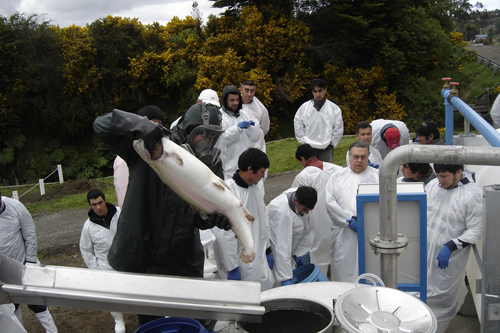Landia Pumps And Mixers Process Salmon For Biogas Plants
In Chile, the world’s second largest salmon aquaculture industry, pumps and mixers made by Landia are playing a key role in the processing of farmed salmon mortalities and by-products

Salmon Into Silage Processing UnitWorking with Global Fluid S.A. of Santiago de Chile, unwanted salmon are macerated in custom-engineered silage processing units, which comprise a stainless steel tank, Landia chopper pump, control panel, recirculation pipe and valves.
Following outbreaks of the I.S.A. virus (infectious salmon anaemia), which have stifled Chile’s blossoming, billion-dollar aquaculture industry, the processing by Global Fluid S.A. and Landia of dead salmon into fish silage has not only helped prevent further contamination, but also produced valuable, protein-rich fats and oils for use in biogas plants and paint manufacturing.
When they enter the Silage Processing Unit, dead salmon weighing as much as 8kg are successfully macerated into slurry by the aggressive cutting system of the Landia chopper pump.
With corrosive formic acid used to prevent silage from turning septic during storage, all Landia components that could come into contact with it are constructed of acid-proof (AISI 316) stainless steel. This includes Landia propeller mixers that are used to agitate the silage during storage, which can be held in tanks for several months or even up to a few years when correctly produced and handled.
Soren Rasmussen from Landia commented: “Taking proper care of waste is a big issue right now in the Chilean salmon industry, and only the highest quality, most durable processing equipment will do”.
Landia also produces a BioChop Ensiling unit for the treatment of fish processing waste – as well as a BioChop hygienisation unit for the mixing and heat treatment of organic remnants, intestines and Category 3 by-products.
In addition, Landia can provide its BioChop Fish silage unit, which has been specially adapted to meet the requirements of the fish-processing industry. This free-standing Landia unit has the advantage over standard ensiling systems in that its pump benefits from a shredder propeller and a specially designed knife system that can handle all kinds of remnants, including bones, intestines, rejected whole fish and other by-products from the fishing industry.
Landia also manufacture the BioChop ProteinProcessor, which extracts proteins from fish and food industry remnants. This advanced technology enables protein to be extracted from shells, bones, feathers and other Category 3 by-products which are left after the processing of fish, shellfish, meat and poultry.
CONTACT
Kurt Tobler
Landia Ltd
info@landia.co.uk
www.landiaworld.com
+44 (0) 1948 661200
Friday 1 June 2012 / file under Machinery | Food and Beverage | Environmental | Engineering



